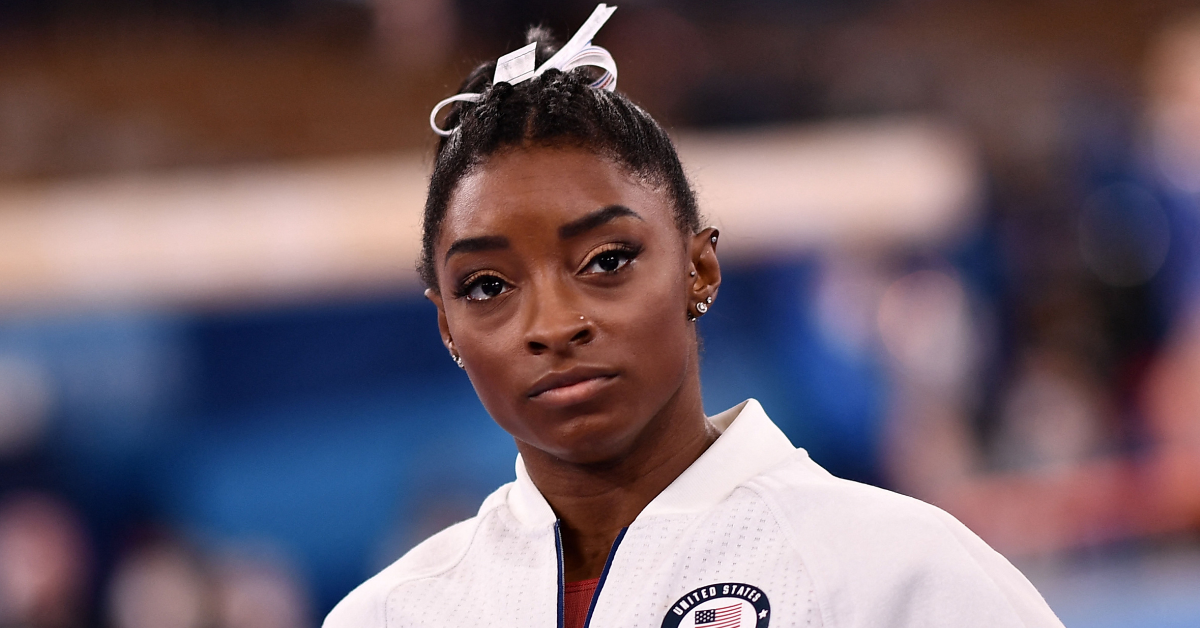*The following article contains mention of suicide/self-harm.
American gymnast and four-time gold medalist Simone Biles posted a video explaining she's still experiencing the difficulties that caused her to drop out of two events in the 2020 Tokyo Olympics.
Biles, 24, has consistently won at Olympic and world events, accruing 30 Olympic and World Championship medals. She is revered as one of the best gymnasts of all time.
Thus, people were astonished when she dropped out of the team and all-around events.
Biles claimed her reasoning was because she came down with a case of the "twisties"—a well-known affliction in the gymnastics community.
In response to the backlash she is receiving, Biles released a video on Instagram with written commentary of her performing.
In the video, we can see her twisties in full force:
On her IG stories, Simone Biles responds to people who think she \u201cquit\u201d on her team by explaining the \u201cthe twisties\u201d she\u2019s been experiencing and what it feels like \u201cnot having your mind and body in sync\u201d \u2026.pic.twitter.com/79hN973rkd— Kimberley A. Martin (@Kimberley A. Martin) 1627618729
The twisties are gymnasts' version of 'the yips' that plague other sports communities, where the athlete seems to lose their skill and abilities for the sport.
The twisties are essentially a psychological state in which a gymnast has trouble judging their spatial placement in the air while performing acrobatic movements and becomes "lost" in their twisting, not able to tell up from down.
This can be a very dangerous affliction for gymnasts, as losing spatial awareness mid-trick while suspended in the air makes landing much harder and can lead to serious injury or even death.
After Biles dropped out she became the target of criticism from mostly White men. People gave her a hard time even though gymnast Sunisa Lee was able to score the gold medal for the U.S. in the individual all-around.
Biles said her case of the twisties "randomly started" after the preliminary competition.
The video shows Biles attempting a twisting dismount from uneven parallel bars and falling on a mat, unable to properly land.
In the video, she writes:
"I didn't quit. My mind and body are simply not in sync."
Biles then goes on to explain what having the twisties is like:
"Sometimes I can't even fathom twisting. I seriously cannot comprehend how to twist. Strangest and weirdest thing."
She also mentions with the twisties, she can't tell up from down while she's in the air.
"What's even scarier is since I have no idea where I am in the air I also have NO idea how I'm going to land. Or what I'm going to land on."
When someone made a comment about Biles being "adorable" when falling, Biles slammed back:
"I don't think you realize how dangerous this is on hard, competitive surface."
Simone Biles opened up about withdrawing from #Olympics events after she experienced "twisties" at practice. "Twisties" affect air awareness, can last weeks and cause injury.\n\n"I don't think you realize how dangerous this is... Nor do I have to explain why I put my health first."pic.twitter.com/MrSmLPGs6p— AJ+ (@AJ+) 1627659060
Many people—including other Olympic gold medal winning gymnasts like Dominique Moceanu—are defending Biles' decision to pull out of the team and all-around events.
This clip should go a long way in describing the erratic phenomenon of \u201cthe twisties\u201d Objective onlookers can clearly see why it\u2019s unsafe/unhealthy to perform gymnastics when the athlete\u2019s software & hardware are not working together. Thanks for posting Kimberley!— Dominique Moceanu (@Dominique Moceanu) 1627651690
Infuriating that anyone can question the courage/fight of #SimoneBiles , in a sport where the smallest error doing the most challenging moves can result in catastrophe. Her explanation (and your posts, DM) are so informative but I\u2019m sorry she feels compelled to explain— Dale Freeman (@Dale Freeman) 1627652551
Swimmer and fellow gold medalist Michael Phelps also advocated support and understanding.
Phelps worked with HBO to produce the documentary The Weight of Gold which covered the high pressure and mental health concerns faced by Olympians which have ended with suicide on more than one occasion—even among medalists.
"We're human beings. Nobody is perfect. So yes, it is okay to not be okay."\n\n@MichaelPhelps reacts to the news of Simone Biles pulling out of the women's gymnastics team final. #TokyoOlympicspic.twitter.com/Jl2gmi7ORu— #TokyoOlympics (@#TokyoOlympics) 1627448561
Wow. What a brave woman to share that. So proud she\u2019s been so open about all of this. Mental health has too long been the hidden demon for so many athletes and so many regardless. Feels like doors are finally opening and more and more willing to be open about their struggles— DEC Management (@DEC Management) 1627619249
I think many people fail to realize that if she had continued and ended up hurting herself, the fingers would be pointed at her for knowing she was not okay and not doing anything about it.— Sanyam Varun (@Sanyam Varun) 1627650564
When a baseball player has the yips they just take them out of the game. When a golfer has them they just have an embarrassing tournament and move on to the next one. When a gymnast has them they could snap their legs like match sticks or much worse.https://twitter.com/bykimberleya/status/1420962059894808578\u00a0\u2026— Nate Igor Smith (@Nate Igor Smith) 1627652641
I know this has been said so many times already, but what Naomi Osaka and Simone Biles did, prioritizing their own mental health in the face of extreme pressure, was so momentous and will leave an impact on so many ppl. They showed you can always say no, & that\u2019s damn powerful.— makiroll (@makiroll) 1627619052
I have so much respect for Simone Biles for being so open about everything and it\u2019s helping a ton of people including me, but it\u2019s also a nice reminder to everyone that she owes you nothing and it\u2019s really none of your business why she quit.— Tony Posnanski (@Tony Posnanski) 1627655709
Biles has not said whether she plans to participate in the apparatus finals at this time.
With her current state, it seems likely she will continue to put her safety and mental well-being before earning another medal at the risk of her life.
If you or someone you know is struggling, you can contact the National Suicide Prevention Lifeline at 1-800-273-TALK (8255).
To find help outside the United States, the International Association for Suicide Prevention has resources available at https://www.iasp.info/resources/Crisis_Centres/
 COMICSANDS
COMICSANDS percolately
percolately georgetakei
georgetakei secondnexus
secondnexus george's picks
george's picks












